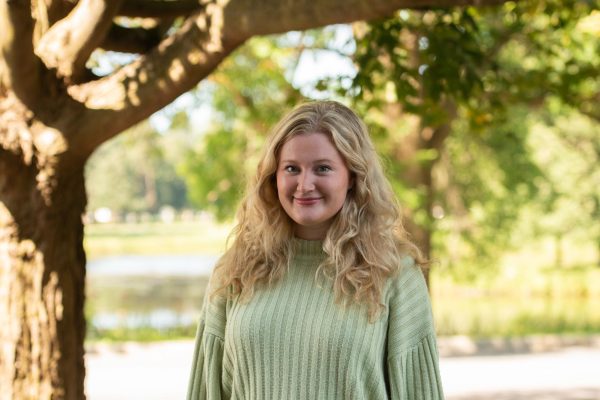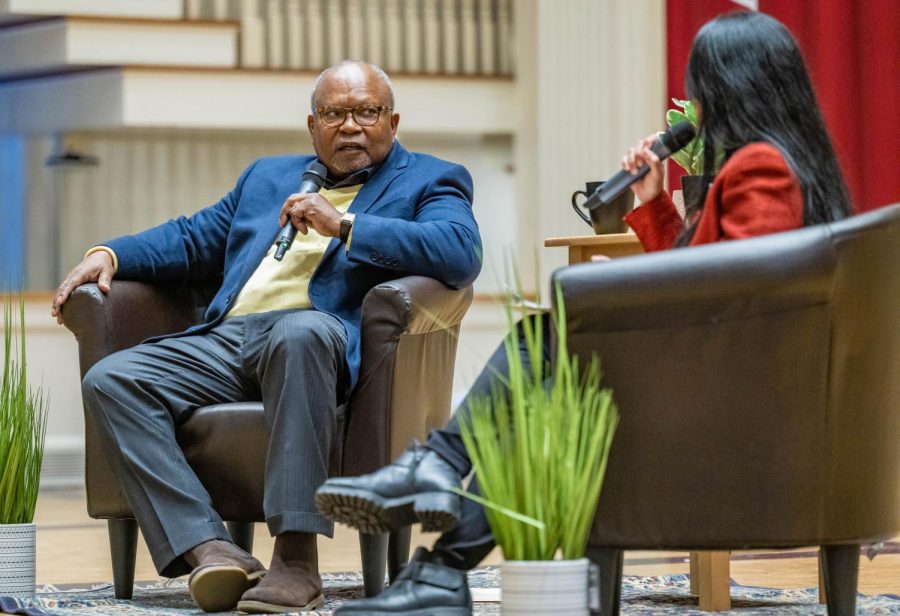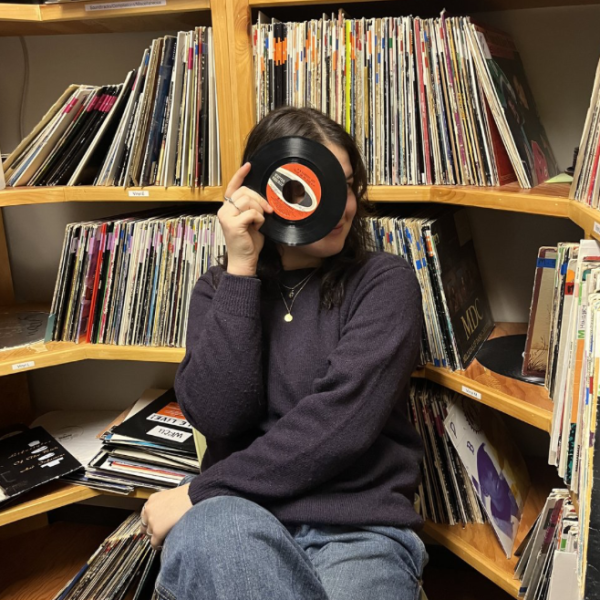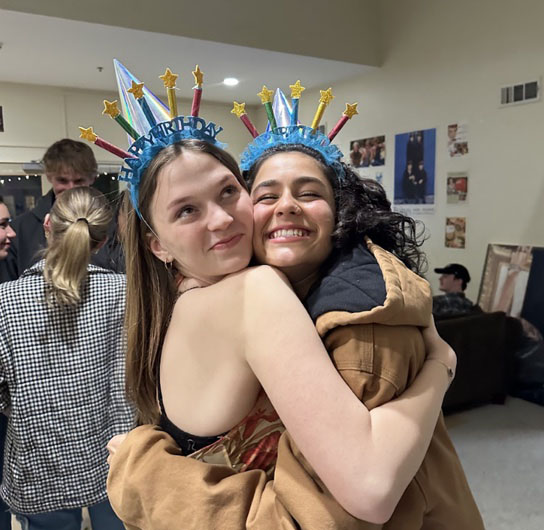ALANA Hosts Week-Long Celebration Honoring Dr. Martin Luther King, Jr.
Colgate University recently celebrated the legacy of Dr. Martin Luther King Jr. with events and festivities throughout the week of Jan. 22. Organized by Director of ALANA Cultural Center Esther Rosbrook, Assistant Director Darline Wattles and Administrative Department Coordinator Carly Dougher, the week was filled with workshops, dinners, and lively discussions.
“We worked on several ideas for months and transformed them into practical actions. Our social justice peer educators, ambassadors, and intergroup dialogue have been instrumental in the students-focused programs, including the vision and unity dinner and the social justice summit. Our communication and Information Technology friends continue to be some of our teammates. The COVE, Shaw Wellness, HAVEN, Health Center, LGBTQ+ initiatives, Chaplaincy, and Campus Safety continue to be our close partners in our annual MLK Week celebrations. We appreciate the enthusiasm of our religious community, including the religious student leaders and Imam,” Rosbrook said.
Rosbrook noted the significance of the theme for the week: “Stronger Together.”
“The ALANA Cultural Center believes that the theme embodies Dr. King’s philosophy and approach to our lives and work—to be united instead of divided due to one’s skin color. The Center believes there is strength in numbers and that the Colgate community is exponentially better together. In our work at the ALANA Cultural Center, we always ask each other, how should we better Colgate and the experiences of its community members? What can we do to help? Where should we start? Our intention to be a part of something bigger and better within Colgate University motivated us to find a theme that would bring people together and answer these questions,” Rosbrook said.
The celebration started with an Opening Ceremony event on Monday, Jan. 23. The lively ceremony featured performances from Safety Fourth, a student band, and the Colgate Resolutions, a student a cappella group. Two student-led dance groups, Sipsam and Wolfpack, also performed. In between performances, junior Kwabena Owusu Ansah and Associate Professor of Writing and Rhetoric Kermit Campbell gave speeches that highlighted the importance of social justice at Colgate.
The week’s main event was the Keynote speech delivered by Bishop Edwin C. Bass ‘71 on Jan. 26. During his time at Colgate, Bishop Bass participated in the 1968 sit-in to protest racial inequity at Colgate. He also served as a community leader following the 2014 shooting of Michael Brown in Ferguson, Missouri.
Rosbrook commented on the decision to ask Bishop Bass to be the keynote speaker.
“[Bishop Bass] is also a social justice activist and religious leader, similar to some of Dr. King’s characteristics. On top of that, Bishop Bass is one of our alumni who was involved in many significant events. He was a student involved in the sit-in that resulted in the demand for the [ALANA] Cultural Center [as well as] a student-athlete. Like most of our alums, Bishop Bass is of enormous value because of his college and professional experiences, insights, time, and, most importantly, their commitment to Colgate University,” Rosbrook said.
During his keynote address, Bishop Bass recalled his role in the 1968 sit-in at Colgate.
“As the history of that moment is recalled, it is those people who spoke with force and elegance that are remembered. I made the conscious decision to take on the responsibility of ensuring the building was not damaged [during the sit-in]. I distributed food, I picked up the trash inside the building and on the surrounding grounds throughout the day. I tended to the bathrooms with the supplies I foraged, I kept vigilant watch over the building and the contents. History makes no note of my actions but I believe they were important and instrumental to the positive outcome that was achieved,” Bishop Bass said.
Bishop Bass then continued with an analogy about construction workers to highlight his style of leadership. He discussed how there are many jobs in the construction field, and many are applauded and celebrated; however, the person who is often forgotten is the single man with the shovel doing a tough and important job.
“Though unvalued and practically invisible, that man can do what a crane cannot do and what the architect will not do. Dr. King said, ‘If I cannot do great things, I can do small things that are great,’” Bishop Bass said.
In 2014, Bishop Bass decided to focus on unification following the murder of Michael Brown. Bishop Bass took to the streets to talk and pray with protestors and the police. He helped unify people and ensured a safer community. Because of his active role, he was asked to speak at Michael Brown’s funeral.
Bishop Bass encouraged listeners to push for justice even if they feel unworthy or incapable.
“I want to encourage you today that everyone can make a positive contribution in the ongoing struggle for justice, for equity for a more perfect union,” Bishop Bass said.
Sophomore Cynthia Ortiz-Naranjo attended the keynote address, and commented on the positive message of the speech.
“One of the questions asked him how he balanced being both a person of faith and a person of color. His answer was comforting to students of faith and he encouraged them to focus on their studies. Although his speech had a lot of religious language, the main message of his speech empowered students of color regardless of their denomination,” Ortiz-Naranjo said.
Sophomore Fredy Alvarado-Retana also attended the keynote address and other MLK week celebrations.
“I believe that the MLK week celebrations were fantastic. I learned a lot and got to interact with some wonderful people. The keynote was great and I felt that the overall message was fantastic. Being ‘stronger together’ was the theme and it really hits home for me because as a student leader on campus, I can for sure say that working together with other groups has always resulted in better events,” Alvarado-Retana said.
Sophomore Vianey Morris was an active participant during the MLK celebration week.
“I think when it comes to social justice work [being ‘stronger together’] is very important. There is a lot of work to do, and there is no one that can get it all done themselves. Instead, we should come together to share ideas, to create a bigger movement, and to support one another,” Morris said.
Morris attended most of the events during MLK celebration week, and she commented on some of the highlights.
“[I] enjoyed them all. The Death Cafe was a highlight for me because I had never been to one before. As well as the [Social Justice] Summit because we had other schools, a few alumni, and I also had a speech,” Morris said.
Morris says Colgate could improve by actively supporting ALANA programming.
“The events should be posted on the school account, so people know they exist. ALANA should not be the only one promoting their own programming,” Morris said.
Ortiz-Naranjo noted how the themes of the week-long celebration echo the work she does in her own life as DEI chair for a Greek Letter Organization (GLO).
“There are many more ways Colgate can improve its DEI, but I look forward to helping create a more equitable and diverse campus,” Ortiz-Naranjo said.
Rosbrook hopes the “stronger together” message is clear to students and faculty at Colgate.
“Dr. King said, ‘Our goal is to create a beloved community, and this will require a qualitative change in our souls as well as a quantitative change in our lives,’” Rosbrook quoted. “I encourage all of us to find joy in anti-racism and social justice experiences in our beloved community and to build connections with people from all backgrounds—because together, we are stronger; divided, we are weak.”

Payton Gore is a senior from Baltimore, MD concentrating in marine freshwater science with a minor in sociology. She has previously served as a staff writer...











